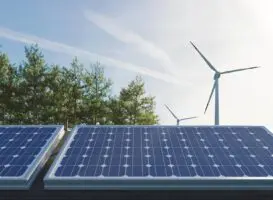The battleground for energy control has long been occupied by the large resources companies, and at the other end, the green-minded efficiency zealots. Today, the debate around renewable energy is becoming mainstream as Australians grapple with issues such as large-scale power outages and the rising cost of domestic power.
One of the key success factors in the recent ACT election was a commitment to a fully renewable state. With some polarising debates around this topic in the past month, it’s important that governments and consumers are well informed about their choices.
Distributed energy technologies such as rooftop solar are the biggest growth areas in the global energy industry, and these new technologies will completely change an industry that has operated the same way for decades.
Investment bank Morgan Stanley recently projected around 2.4 million Australian homes will install solar and battery systems in the next few years. They also predicted these systems will have a payback time to the household of less than 10 years, which is easy to identify with early adopters already benefitting from energy savings of up to 80 per cent of their power bill, sometimes even more.
How battery technology is a game changer for renewable energy
Using large-scale batteries to store electricity isn’t particularly new, but traditionally such systems, usually based on lead-acid batteries, were bulky, required careful safety procedures, regular maintenance, and were very expensive.
They were limited to niche applications – for example providing backup power in telephone exchanges, or supporting off-grid power systems in very remote areas. As far as residential battery systems, this was practically unheard of and reserved to, let’s say, a very particular type of individual.
The arrival of new battery technologies such as advanced lead acid and lithium batteries has completely transformed the industry. Today we are seeing affordable, compact, minimal-maintenance, and long-lasting battery systems appearing on the market from major vendors such as Panasonic, LG, Samsung, Tesla and Enphase.
These new batteries are specifically targeted at installation in people’s homes and the price of these systems are decreasing significantly – common lithium battery cells have been dropping in price by around 15 per cent per annum over the past several years and such batteries will continue to rise in popularity.
Similar to batteries, solar too, had its challenges. One of the early conundrums with solar electricity systems was that they produce their maximum output in the middle of the day, when in many houses nobody is home and the electricity load is relatively low.
Batteries now solve this problem, by saving the solar energy generated in the middle of the day, and making it available in the evening when the household loads are high, and the electricity prices expensive.
Driven purely by economics and their practical benefits, the uptake of distributed solar and battery storage in Australia’s electricity industry is akin to the disruption digital photography caused film, or the mobile phone caused traditional telephony. Importantly, whilst the approaching changes will be massive and profound, they aren’t anything to be afraid of.
What’s next?
In the current energy landscape, the emergence of a product which combines best of breed in solar, battery storage and smart technology gives us a glimpse of the new frontier of energy in Australia.
With its ample solar resource and deregulated energy markets, Australia is at the forefront of pioneering new business models in the distributed energy space and is set to be a global leader.
Taking advantage of these favourable market forces, last month, renewable energy tech startup Evergen (backed by the CSIRO and investment leader AMP Capital) launched in the Australian market – the nation’s first remotely-managed intelligent renewable energy centre for domestic use.
Evergen combines the strength of solar and batteries with smart technology, where the system can continuously analyse and optimise home energy costs, always choosing the most efficient source between solar, battery and the grid.
Looking forward, Australian trials are being planned for microgrids, and “transactional” energy systems. This is where local houses and buildings essentially trade energy between themselves, providing complete independence from the grid, and often improving power quality and reliability. Evergen’s intelligent energy technology, available today, is the first step in this direction.
The next 12 months in particular will see critical changes and developments to the renewable energy sector as Australians start to take advantage of the new opportunities to manage their own energy destiny and energy costs. The power is indeed in the hands of the consumer.
Rapid advances in technology have given individual consumers more choice around how their energy is drawn, stored and managed. This is not only returning the power to the people, it is significantly reducing energy costs at a time when big energy companies are expected to continue increasing prices.
With its ample solar resource and deregulated energy markets, Australia is at the forefront of pioneering new business models in the distributed energy space and is set to be a global leader.
Dr Glenn Platt is CEO of Evergen.









